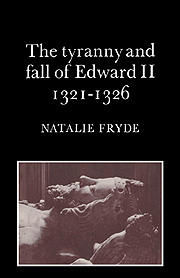Book contents
- Frontmatter
- Contents
- Preface
- Abbreviations
- 1 Problems and sources
- 2 Introduction: The king and the magnates before 1318
- 3 The rise of the Despensers
- 4 The civil war, 1321–2
- 5 The aftermath of the civil war: Imprisonments and executions
- 6 The aftermath of the civil war: Confiscations and the territorial settlement
- 7 Royal finance, 1321–6
- 8 The Despensers' spoils of power, 1321–6
- 9 The defeat in Scotland, 1322–3
- 10 The French war
- 11 The opposition to royal tyranny, 1322–6
- 12 London
- 13 Queen Isabella's invasion and the end of the regime
- 14 Edward II's deposition and ultimate fate
- 15 Epilogue: The regime of Mortimer and Isabella
- Appendix 1 Properties of the Despensers: Main facts and sources
- Appendix 2 The deposition of Edward II
- Notes
- Cited classes of records at the Public Record Office
- Sources
- Bibliography
- Index
11 - The opposition to royal tyranny, 1322–6
Published online by Cambridge University Press: 09 October 2009
- Frontmatter
- Contents
- Preface
- Abbreviations
- 1 Problems and sources
- 2 Introduction: The king and the magnates before 1318
- 3 The rise of the Despensers
- 4 The civil war, 1321–2
- 5 The aftermath of the civil war: Imprisonments and executions
- 6 The aftermath of the civil war: Confiscations and the territorial settlement
- 7 Royal finance, 1321–6
- 8 The Despensers' spoils of power, 1321–6
- 9 The defeat in Scotland, 1322–3
- 10 The French war
- 11 The opposition to royal tyranny, 1322–6
- 12 London
- 13 Queen Isabella's invasion and the end of the regime
- 14 Edward II's deposition and ultimate fate
- 15 Epilogue: The regime of Mortimer and Isabella
- Appendix 1 Properties of the Despensers: Main facts and sources
- Appendix 2 The deposition of Edward II
- Notes
- Cited classes of records at the Public Record Office
- Sources
- Bibliography
- Index
Summary
The king's reluctance to leave his kingdom to render homage to the king of France is very understandable when one examines the internal condition of the country at the time. Edward had undoubtedly recruited a remarkably able judiciary whose intelligence, wit and learning is amply attested in the earliest surviving law reports, the Year Books. The best of these men, William Herle, described as ‘the greatest lawyer of his age’, Geoffrey le Scrope and John Stonor continued their brilliant legal careers under Edward III. Unfortunately there is no sign that the ability of these men in court could halt the tide of banditry, raiding, gang warfare and murder outside the courts, which characterised both the countryside and the capital under the Despenser regime. The lawlessness often had its basis in the unending feud between the Despensers and the fugitive followers of the dead earl of Lancaster. Neither side behaved better than the other. For every good justice whom Edward employed, he kept at court or used in the localities several men who were nothing more than aristocratic criminals. The misdeeds of the Despensers themselves have already provided us with a grim chapter. Edward favoured a number of other lawless personalities. At the beginning of the reign Gilbert Middleton, captor of the cardinals and Robert Ewer, who was to lead two rebellions, were both favoured knights of Edward. Malcolm Musard, terror of the small landowners in the Midlands, was also employed by him.
- Type
- Chapter
- Information
- The Tyranny and Fall of Edward II 1321–1326 , pp. 149 - 164Publisher: Cambridge University PressPrint publication year: 1979



